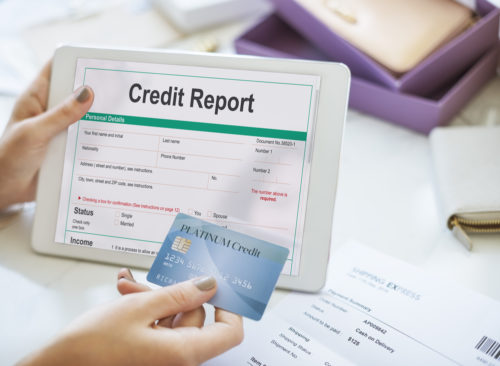Your credit report is an indicator of your financial stability, trustworthiness, and general ability to handle debts and credit responsibly. Lenders look over a credit report to determine if a person qualifies for a loan (or credit card) and how much money they are willing to give them. Additionally, many employers will look at a credit report to see if a potential employee is financially trustworthy, and renters use it to see if they have a history of missing payments.
Credit reports have a major influence on what you can do, so being accurate is very important, both to the credit bureaus, and to you. Yet, mistakes can happen. Credit bureaus aren’t perfect, and your credit report probably isn’t 100 percent accurate. Especially since there are three major credit bureaus who collect your information, it’s possible that there are differences and mistakes in each credit report you get.
Table of Contents
Each Credit Bureau Has Their Own Information
The three credit bureaus in America are: Equifax, Experian, and TransUnion. Each of them gathers, measures, weighs, and reports on your information in their own way. They gain that information from different lenders, creditors, banks, and companies you pay bills regularly to, like landlords and utility companies.
Yet, not every bureau has the same connections, or are getting the exact same amount of information for each person. One company might have your bank and credit cards reporting back on you, but not your utility companies. Meanwhile, a different bureau might have your bank and credit cards, plus your payment history to utility companies. One is more accurate because it gets more information.
No credit bureau has all of your information. Each of them will have gaps that the others might have filled. This can lead to minor or major differences between scores depending on the report you look at.
What If The Wrong Information Is Used?
Credit bureaus rely on lenders, creditors, landlords and banks to send your information to them, yet sending that data can get messy. There is no penalty for any of them making a mistake, so errors can easily be made on the accuracy of this information.
For example, let’s say you do most of your business under your full name, but you happen to pay your bills under a nickname or preferred name. Since a new name is being sent to the credit bureaus, they will create a new file to fit the name they were given, meaning it’s not connected to your account.
On the other hand, a person sending the information might accidently put down that you missed a payment when you didn’t. Maybe they were distracted, or confused, or malicious. But a mistake is sent to the credit bureau due to human error, and they log it into your credit report.
Another dispute for accuracy is the frequency with which information is sent in. Not every company, lender, and bank you do business with sends in your information every month. They might have a policy to only send in information every 3 months, or only report when you miss a payment, but not all the times you do pay your bills on time.
A Case of Mistaken Identity
Since there are no hardcore regulations when it comes to reporting your information, a wide variety of information is flooding credit bureaus, much of which is confusing to differentiate between. You’ve got people with multiple names but the same social security number, people with the same exact name and social security numbers that are one digit off, people with the same name, living in the same town who share a birthdate, and relatives with exactly the same name except one of them is called junior.
If you have a very common name, it becomes more likely that credit bureaus will mix up your information and accredit other people’s financial success or blunders to you. While credit bureaus have gotten better at preventing this, it is still a common occurrence, and if your financial doppelganger is having some hard time, it could severely hurt your credit score.
Fraudulently Stolen Identities
When your identity is stolen, a criminal is using your name, birthdate, and social security to take out loans, credit cards and more, all in your name. Unless you catch it early on, most creditors, and credit bureaus just think that you have gone on a massive shopping spree and expect you to pay the bill. When you fail to pay off your debts (because you didn’t know about them in the first place) it becomes a massive black mark on your credit report.
But this isn’t accurate! You didn’t take out those cards and loans, you are a victim. You shouldn’t be penalized just because someone stole your identity. You can fight against it and fix your credit, but if you aren’t aware of your victimhood, your credit report won’t accurately represent you.
Many credit bureaus offer ways to help protect yourself and your credit reports from identity theft. They can monitor and alert you of suspicious credit inquires and missing payments that don’t match your spending habits. Not only does this help keep their records more accurate, it helps protect you too.
What If You Have No Credit?
When a person starts their journey into adulthood, it’s very likely they have no credit. It’s possible that a person could be very financially stable, with a good job and makes good choices, but never dips their toes into debt and credit. It’s actually very common for rich people to have poor credit because they almost never have to take out a loan or use a credit card.
Especially in rising generations, many have been taught to avoid using credit cards, one of the few tools young people can use to build their credit. So, credit bureaus might not even know they exist, thus leading to no credit report and no score. This makes them a financial wildcard for many creditors and lenders. This lack of a credit report could even be a misrepresentation of a person’s financial responsibility, where a person who is smart with money but avoided debt is penalized.
What Time Did You Check Your Credit Report?
Your credit report is constantly updating because you are constantly buying stuff, paying bills, and using your credit card. Yet, there is a time gap between you paying off your credit card and it showing up on your credit report. This could be a few weeks, 30 days, or several months, depending on when the info gets sent to the credit bureau.
If you pick up a credit report today, it could still be missing important things from several months ago. That doesn’t mean it won’t get up to date someday, but it could be missing key things right now. This could paint a very different financial picture than what you are actually in. You might be able to brag about having a high credit score and flawless report, but actually aren’t in a good situation because you just missed paying several bills the week before, which will eventually show up on the report.
Making It Accurate
You can do your part to make your credit reports accurate. The more accurate a credit report, the better situation financially you will be. Especially if there are loads of mistakes, even from a mistaken identity, stolen identity, or just from people messing up, you can transform a poor or mediocre credit report into a very pleasant report. It just requires reaching out to credit bureaus and using the right methods to correct it.
Even if you have made financial mistakes, the sooner you can get those mistakes to show up, the sooner you can get them off. Instead of your credit report, and in turn your credit score, slowly dipping as mistakes roll in, get it all done at once. Then, in five to ten years (depending on what kind of mistakes you make) those mistakes will drop off your credit report, leading to an improvement of your credit score.
Looking for more information on your credit score and credit report? Visit our credit score resource and learning center.
Image Source: https://depositphotos.com/





